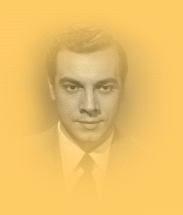
Voice in the Night

Reviewed by Derek McGovern
Overhead the moon is beaming
White as blossoms on the bough
Nothing is heard but the song of a bird
Filling all the air with dreaming...
These were the words that introduced me to Mario Lanza way back in 1973. I was just eleven at the time, and my father had brought home a copy of the LP The Student Prince and Other Musical Comedies. "Now I want you to listen to this guy," my father had said. "He's the next best thing to Caruso." Well! Not only was I ignorant of Caruso, but the very thought of any opera singer at that time would have sent me running from the room. But I stayed, and moments later my entire world changed.
To this day those opening lines of the Serenade send a shiver down my spine. The magical quality of the phrasing, the way he pronounced "white," the sheer opulence of the voice; all of these things transported me to a world I had never imagined possible. Indeed it seemed - to echo the words of conductor Constantine Callinicos - that a tremendous joke was being played on me, such was the almost unbearable beauty of the voice. In Lanza's singing, the romantic dreamworld I had always longed for became a reality.
Over the next few weeks I played the LP endlessly, discovering the fabulous Drink! Drink! Drink! and Beloved, among other favorites. Then The Great Caruso came to New Zealand on one of its periodic re-runs. Actually being able to see Lanza thrilled me beyond words. Here was a man with charisma to spare whose personality seemed to overflow with generosity of spirit. His wonderful introduction to opera made me want to learn more. I began seeking out other tenors, including the man whom my father had placed above Lanza. But Caruso disappointed me. He sounded exactly as he looked! Where was the romantic magic so evident in Lanza's singing? Even my father conceded he may have been wrong about the number two placement.
Five years went by before I discovered that a club devoted to my hero existed in nearby Wellington. The New Zealand Mario Lanza Society had been established in 1974 to promote Lanza and other singers of his ilk. Far from being a "fan club," the society boasted a high proportion of sane members who simply enjoyed getting together to share their love of great singing. Concerts by local singers were a regular event at the society, and Lanza's films were occasionally shown, thanks to the ingenious "loans" from Television New Zealand that the club's president, Lindsay Perigo, was able to procure.
I was more than a little in awe of Lindsay. He had a fearsome reputation - or so it seemed to me - deriving from his celebrated television interviews with the politicians of the day. But he became a close friend and - after Mario - my chief musical educator. Through Lindsay's urging, I listened to a great number of other singers (Carreras, Wunderlich, Moffo, et al) and learned to appreciate their virtues, at the same time never losing sight of the man who had made it all possible.
Learning Italian became a new goal for me, so off I went to Italy with the additional aim of meeting some of Lanza's associates. It was 1982, and the Rome telephone book contained the numbers for several of Mario's conductors, including Paul Baron and the esteemed Franco Ferrara. At that stage I was too unsure of my Italian to call Ferrara (much to my later regret), but Baron agreed to meet me in his swanky apartment overlooking the Vatican.
Visually, he reminded me a little of Walt Disney, but there the comparisons ended. He had none of the latter's warmth, brusquely declaring that I had just ten minutes to interview him and that he really did not want to talk about the tenor. (Only later did I learn that Baron had been dismissed after demanding a sizeable cut of Lanza's future earnings.)
It was a frustrating conversation. Baron began by asserting that the young Mario Del Monaco had the better voice, and that Lanza - in any event - was really a baritone. He spoke of Lanza's physical decline, which he said had affected their recordings together, and stated that "no intelligent man would have screwed up his career the way that Mario did." He also commented - disapprovingly, I sensed - on Mario's fondness for driving to Rome's Fiumicino Airport with his children to watch airplanes taking off and landing. "That man got a kick out of the damnedest things!" he declared.
I had a happier experience when I visited the Villa Badoglio in Parioli, a swanky suburb of Rome. Situated at 56 via Bruxelles, I discovered that the Lanza family's former residence now housed the Chinese Embassy. Within moments a Chinese security guard appeared, demanding to know my reason for being there. I tried to explain - in faltering Italian - that a famous tenor and his family had once lived there, but he denied this and ordered me to go away at once. "Non c'e' Lanza qui!" But the story had a happy ending. Across the road were two young Italian men - complete with machine guns - guarding what I think was the Iranian Embassy. They were curious to know what all the fuss had been about, and when I mentioned "Mario Lanza," the name galvanized them. "Oje vita, oje vita mia!" they sang, waving their machine guns excitedly.
On my next visit to Rome in 1986, I discovered that Baron and Ferrara were no longer in the Rome telephone directory. However, the popular conductor-arranger Carlo Savina, who had worked with Lanza on his final movie, was listed and I plucked up the courage to ring him.
Savina was as positive as Baron had been negative. After praising Mario's voice as "unica" (unique), he went on to speak movingly about the man he had considered "tanto dolce" (so sweet). He recalled a certain sadness in Mario's character, but described him as a man of great heart who had put his very soul into his singing.
And that, I feel, is the key to Lanza's appeal. The words are everything to him, and in this respect he is the antithesis of the Sutherlands and the Pavarottis, for whom singing often seems little more than an impressive technical exercise. While they sing notes, Mario sings words. His complete conviction can transform even the tritest of material into a memorable occasion. As the arranger/conductor Christopher Palmer wrote in 1993, Mario "rarely sang trash, and on the rare occasions when he did, he made it sound better than it had any right to sound."
Ironically, it is often this sheer commitment to his material that upsets some listeners, unaccustomed to such displays of "vulgar" emotion. But they are undoubtedly the losers. For what they are missing out on is the life-affirming experience of a voice of magnificent range, color, and vitality.
This is a highly unusual voice. Its sensual quality immediately sets it apart from most other tenors. To quote one critic, it had a timbre that "other singers would kill for." Certainly, few tenors come close to emulating the glorious romanticism of the voice. I always like to introduce friends to Lanza with his 1950 recording of E Lucevan Le Stelle. This magnificent rendition perfectly illustrates the romantic longing in his phrasing ("Mi cadea fra le braccia"), as well as the passionate intensity of his singing ("E non ho amato mai tanto la vita...tanto la vita!"). It never fails to amaze friends. "Bloody hell!" they exclaim. Few fail to detect his crystal-clear diction; all marvel at his complete involvement in the aria. Lanza, the true vocal poet.
In his brief career Mario made a surprisingly large number of definitive recordings. This is surely the yardstick by which we measure any great singer's legacy. Who will ever forget the tender love songs he recorded for his radio show: Some Day, Romance, If I loved You, Without a Song, Yesterdays, I'll Be Seeing You and countless others? The Student Prince contains some of the most ravishing singing ever recorded by anybody. His great operatic recordings include the 1950 Improvviso from Andrea Chenier, several splendid Vesti la Giubbas (most notably his deeply moving rendition in For the First Time), a gorgeous M'appari', a much-neglected Cielo e Mar from his radio show, and two recordings which are beautiful beyond compare: Che Gelida Manina and the Otello Monologue, Dio! Mi Potevi Scagliar.
But if I were allowed just one collection for that proverbial desert island, it would be the album Mario! Recorded just ten months before his death, it captures the mature Lanza at his most compelling. This is the later voice - darker, rounder, alternately restrained and passionate. The baritonal quality that so confused the redoubtable Mr. Baron is very much to the fore, while the upper register retains its effortless top. I find myself returning to this album again and again, marvelling anew at the insight that Mario brings to these often-melancholic Neapolitan songs.
Passione, Canta Pe' Mme, the haunting Fenesta Che Lucive, Tu Ca Nun Chiagne, 'Na Sera 'e Maggio, and the joyous Come Facette Mammeta are all unforgettable. But one song, Voce 'e Notte (Voice in the Night), stands apart from all other recordings that he made.
The song expresses the anguish of a lovesick man, alone in the night, who happens to gaze up at the bedroom window where his beloved now lies in the arms of her husband. If ever a person wanted proof of Lanza's complete identification with his material, here is the perfect example. I once reduced a family of Neapolitans to tears with this recording. "For God's sake, put something happy on - quick!" urged my New Zealand companion, alarmed by their reaction. But he needn't have worried. For I could not imagine a greater compliment to the artistry of Mario Lanza than this spontaneous display of emotion.
Mario: ti saluto.
